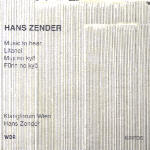The German avant-garde has done it again, producing another composer who lives in serious fear of not being misunderstood. Hans Zender, whose music is a little more palatable than most of his Kairos-label contemporaries (probably because he is a conductor who deals with both new music and standard repertoire), is fighting a losing battle against an invisible enemy. Little wonder he made an opera out of Don Quixote; Zender charges his musical windmills head-on. This isn’t to say that all of the music is bad. There are wonderful passages in Music to hear (how many composers must set this obvious text?) involving flutes playing in microtones, while some of the descending orchestral punches have a cartoonish snap to them, frivolous and fun without being trivial. In Muji no kyô (some of Zender’s “Japonoiserie”) there is a borderline-miraculous moment where cascading piano textures activate a breathtaking celestial harmony. However, moments like this are all too rare.
The best thing about this disc is the sound quality: the singers are carefully and intimately recorded and the accompanying ensembles are crisp and forward. It’s a shame that they don’t have better material to work with. Both Johann Leutgeb and Julie Moffat sing admirably, infusing the icy music with expression and emotional depth. Moffat valiantly tries to make sense of a discontinuous setting in Music to hear–the gaps between words, and even between syllables, make for interpretive impossibilities–in a piece where the words and even the vocal line are frustratingly ancillary. The three cellists probably play well in Litanei, but it’s hard to tell; the whole piece sounds like a disorganized mess. Not unexpectedly, the specious and over-analytical liner notes offer little in the way of explanation, leaning instead on their own avant-verbosity and incomprehensibility, daring you not to “get it”. Don’t be alarmed if you don’t, it’s not your fault.
































